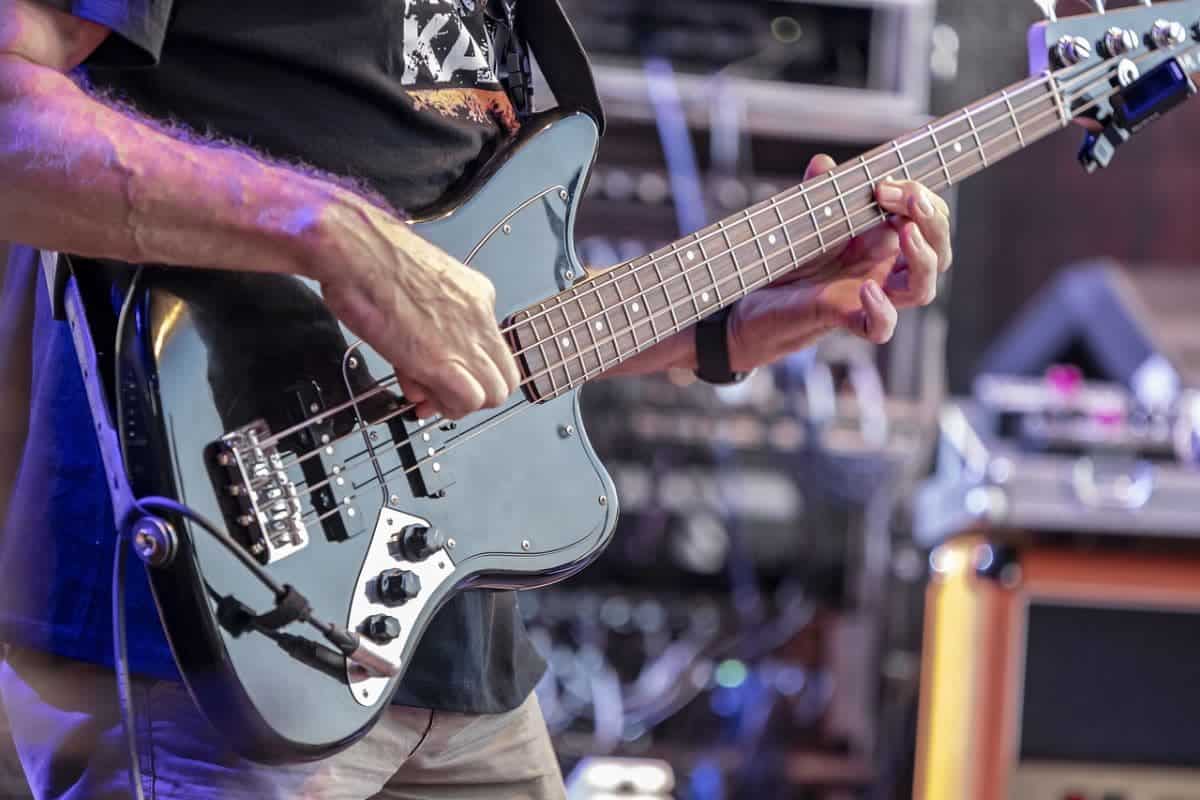The bass is the instrument that is the foundation of your band. Without a good bass guitar, you won’t have the foundation that your band needs. The bass is the foundational element of most music. The bass usually lies between 30-150 Hz. Below is epic showing how low it lies on a frequency space.
The word “bass” can refer to any stringed instrument with a sound lower than that of the mid-pitched violin family, which includes violins, violas and cellos.
The bass the foundation of every band. Without a good bass guitar, you won’t have the foundation that your band needs. The bass is the foundational element of most music. The bass usually lies between 30-150 Hz. Below is epic showing how low it lies on a frequency space.
The word “bass” can refer to any stringed instrument with a sound lower than that of the mid-pitched violin family, which includes violins, violas and cellos.
In this article, we are referring specifically to bass guitars. They are used in many styles of music like rock, country, pop and jazz.
Many famous musicians play bass guitar including Paul McCartney (Beatles), John Entwistle (The Who), Chris Squire (Yes) & Geddy Lee (Rush). Some well-known brands for bases include Fender Precision bass, G&L L-2000 and the Ibanez SR.
There are a lot of bass guitars available on the market which makes it hard to decide, especially if you’re new to playing this instrument. There is no perfect beginner guitar; they all have their flaws but there some brands that seem more popular than others.
As a beginner, go for an instrument which has the minimum flaws and is easy to play so that your learning process will be quick and enjoyable.
In this article, we are going to see how to spot a terrible bass. And we will see what brands make terrible basses. You’ll walk away with the knowledge to buy an instrument that will serve you for many years. In this article, we are going to see how to spot a terrible bass. And we will see what brands make terrible basses. You’ll walk away with the knowledge to buy an instrument that will serve you for many years.
How to Spot a Great Bass
The first and most important thing to keep in mind is that a bass guitar should sound great with no effects applied. You can’t judge the tone of an instrument by looking at its specs online, because those numbers don’t reflect how it feels when you play it through your amp. Great bass guitars have distinctive voices-a look, feel, and tone all their own.
To understand what makes a great bass sound so good, you need to know how it works. Most electric bass guitars are fretted in the same way as an electric guitar: each fret represents one semitone (or half step) on the chromatic scale of notes that differ by two-for example, G and G-sharp. If you play a note, then fret the same string at any other position and once more, that’s two semitones (or one tone) up from your starting point; you’ve just played an interval of a major third. That says nothing about how these notes relate to each other in context-only regarding the open string.
A great bass has a sound that’s unmistakable. Many of the best bases are known for their ability to cut through any band mix-even with an electric guitar soloing underneath them or other instruments playing at full volume. That’s because they have clarity and focus without sacrificing warmth; you can hear all the notes, and you can hear them as part of a cohesive bass line.
A terrible bass will lack clarity. It will be muddy and sound like mush in the mix of your band. If you hear the bass guitar jumping all over the fretboard, then it is likely that your instrument will sound terrible, too.
Editor’s note: Even the best bass in the world won’t turn you into a significant player. Excellent bassists practice the right way. Every day.
Atrocious vs Excellent Basses: A Comparison
A great bass has a high-quality sound, whether you play it acoustically or plugged in. It will even continue to sound good when amplified through an amp with other instruments playing at the same time (like drums and electric guitars).
A terrible bass will have poor intonation and be out of tune. If your instrument has really top action, then most likely it’s because the string spacing is too small or the neck is too thick.
A great bass has a low action that allows you to play fast with no string buzz or finger squeak. The perfect combination of pleasant wood, fine tuners and smart design can help achieve this sound.
A terrible bass will always have some kind of buzzing from the strings hitting other frets, which changes depending on where you move your fingers along the neck. A bass that has top action will be difficult to play.
A great bass is easy to handle and feels nice in your hands; it doesn’t feel too heavy for extended sessions, nor does it feel light as a feather-it should have an even weight so that both holding down strings and plucking are comfortable.
A terrible bass will have a neck that’s too thick or thin, so it won’t be fast to play with and you’ll get tired soon of pressing the strings down on your instrument. A heavy bass is not good because then your hands will tire quickly while trying to hold down notes in order to create a bass line.
A great bass can produce a range of sounds, from warm and jazzy to more aggressive rock tones-it should be able to do all this without sounding like it’s struggling or fighting against you as you play.
A terrible bass will sound thin and tinny on the lower notes; they’ll be difficult to hear in a mix and lack depth.
A great bass will feel comfortable in your hands, whether you’re playing with fingers or plucking the strings; it should be ergonomic so that both right-handed and left handed players have no problems holding down notes for long periods of time.
A terrible bass feels uncomfortable to play due to sharp edges on the neck or body, makes your hands cramp up and feels like you’re fighting against the instrument to get it to do what you want.
A great bass sounds clear through an amplifier when plugged in; it doesn’t sound thin at higher frequencies nor does it have too much bottom end that’s overwhelming other instruments playing with it.
A terrible bass will have a muddy sound with too much bottom end and not enough top frequencies. Even if your instrument is plugged in, it won’t sound good through an amp-the tone might be wrong or the notes don’t resonate clearly.
Issues of Playing on a Terrible Bass
The main issue of terrible bass isn’t necessarily the fact that it’s going to sound like a construction site. Rather, that it will stifle your growth as a musician.
Poor quality bass guitars can be difficult to play and they will not reward you for your effort. You’ll never improve as a guitarist if the instrument you’re playing on is always fighting against your technique and straining under pressure.
A great bass guitar encourages growth, so that even though it might take time to adjust to an excellent instrument, you’ll be able to do so quickly.
A terrible bass guitar will always impede your progress as a musician, whether that’s because it won’t play in tune or sounds awful-you’ll never become the best guitarist if your instrument is constantly holding you back.
Worst Bass Brands to Avoid
Being a new musician is hard. You don’t want to splurge on a high-quality bass, but you also want something that doesn’t suck. Fortunately, most suitable instruments hold their resale value, which means you shouldn’t lose too much money by buying something that is actually good.
However, if you’re strapped for cash, avoid the following brands. They’re going to provide you with an instrument that sounds horrible and impedes your learning.
Plus, they’re almost impossible to sell, because most people know they are awful.
Rogue
Rogue bass guitars are known for their low price, and this comes at a cost because the sound is very poor. Their build quality is also substandard. Rogue instruments lack clarity and don’t have good intonation either. Basically, nothing works well with them.
Thus, avoid them at all costs. They are a waste of time and money. You won’t learn anything by playing on them. Except the sorrow of playing a terrible instrument.
What’s peculiar about them is that it’s very hard to find info about them. For example, they don’t have a website, and you can only buy their product through websites such as GuitarCenter and eBay.
J&D
J&D instruments are made in China, and they’re a good example of how not to run a business. They have very poor customer support because when you buy their product, it’s unclear what warranty or guarantee you’ll get if the instrument breaks down-it could be none!
Their sound is rather thin with little bass, so that even though you might be tempted by their low-price tag, the instrument will only frustrate your efforts to improve as a bassist.
Much like many of its Chinese counterparts, the brand doesn’t have a website. You can buy its basses in specialized store like here and here.
Dean
Dean basses have a much better sound quality than Rogue or Sam Ash instruments, but they’re still not very good. Not only are their necks thick and cumbersome to play with because of this thickness, even when you plug them into an amp, the notes don’t resonate clearly-they lack clarity in tone.
The biggest issue with Dean is the inconsistency in quality. Some of its models-especially those in the mid and high price range-are outstanding. But their lower-end ones are dreadful. They’re clunky, they sound awful, and the knots refuse to work sometimes.
B.C. Rich
B.C. Rich basses are very popular with punk and metal players because the look of them makes it easier to play fast pieces-they have a more aggressive tone than other basses, and they’re better suited for high frequencies as well since they’ve got a thinner neck.
The problem with their basis is that they go out of tone almost immediately and they’re also quite heavy. If you’re going to stand while playing and don’t have powerful arms (and a ton of patience), you’ll hate it.
Plus, the build quality leaves a lot to be desired. Their bridges are awful, and the thinner neck, while looking mega cool, is far from desirable in an instrument. They break easily. If you will not do anything extreme with them, then sure.
But since they are made to play metal, we’d expect a bass that can survive in some hectic situations.
How to Salvage a Terrible Bass
Buying a terrible bass is not the end of the world, since most of its parts are replaceable.
This is great, since often a bass sounds terrible because of one or two parts. You can replace the low-quality parts and end up with a great bass.
Here is a list of things you can replace:
Bridge pickups
The bridge is the part of your bass that transmits the vibrations from the strings to the amp. It’s also where you adjust intonation, so it has a major influence on sound quality. If yours came with plastic parts or just very low-quality ones, then replace them with graphite bridges and hardened steel saddles. This will make the sound brighter and more resonant, which is always better.
Neck pickups
These are also important for tone quality because they directly affect timbre-the way your bass sounds under different frequencies-so buy some humbuckers to replace those junk single-coil ones that came with it if you want a better sound.
Tuning machines
These are the machine heads that hold your strings in place, so they’re responsible for keeping them perfectly tuned at all times. Replace this if you have problems with the ones that came with your bass-the tone will immediately improve after replacing tuning pegs because it means notes don’t go out of tune nearly as often.
If you think the neck of your bass is just too cumbersome, then replace it with another one that has a thinner profile-the sound will be much brighter and more resonant than before.
Knots
If you decide to get a new bridge for your bass, then make sure that the knots are good. If they’re not, replace them with better ones-they will hold the strings in place and prevent rattling while playing.
Control plate
These are those flat metal plates under the strings that you can see when looking at your bass from above. They’re responsible for shielding noise, so it’s important to get one with good quality-cheaper ones produce more annoying frequencies than others.
Conclusions
Your journey into the world of music starts with the instrument. So, you want an instrument that isn’t going to block you from progressing. Which is what the brands on this list will do if you get one of their products.
Playing bass as a novice is already complicated enough. You don’t want to sound too far off from your teacher or your favorite bands just because your bass sounds like a cat in heat.
The best way to approach the bass-buying process is by visiting your local stores and trying out their bases. After all, if the worst bass in the world plays and feels great to you, what does it matter? At worst, you’ll read strangers online spewing hate on it. But why would you care? You are playing for yourself.
Also Read:













